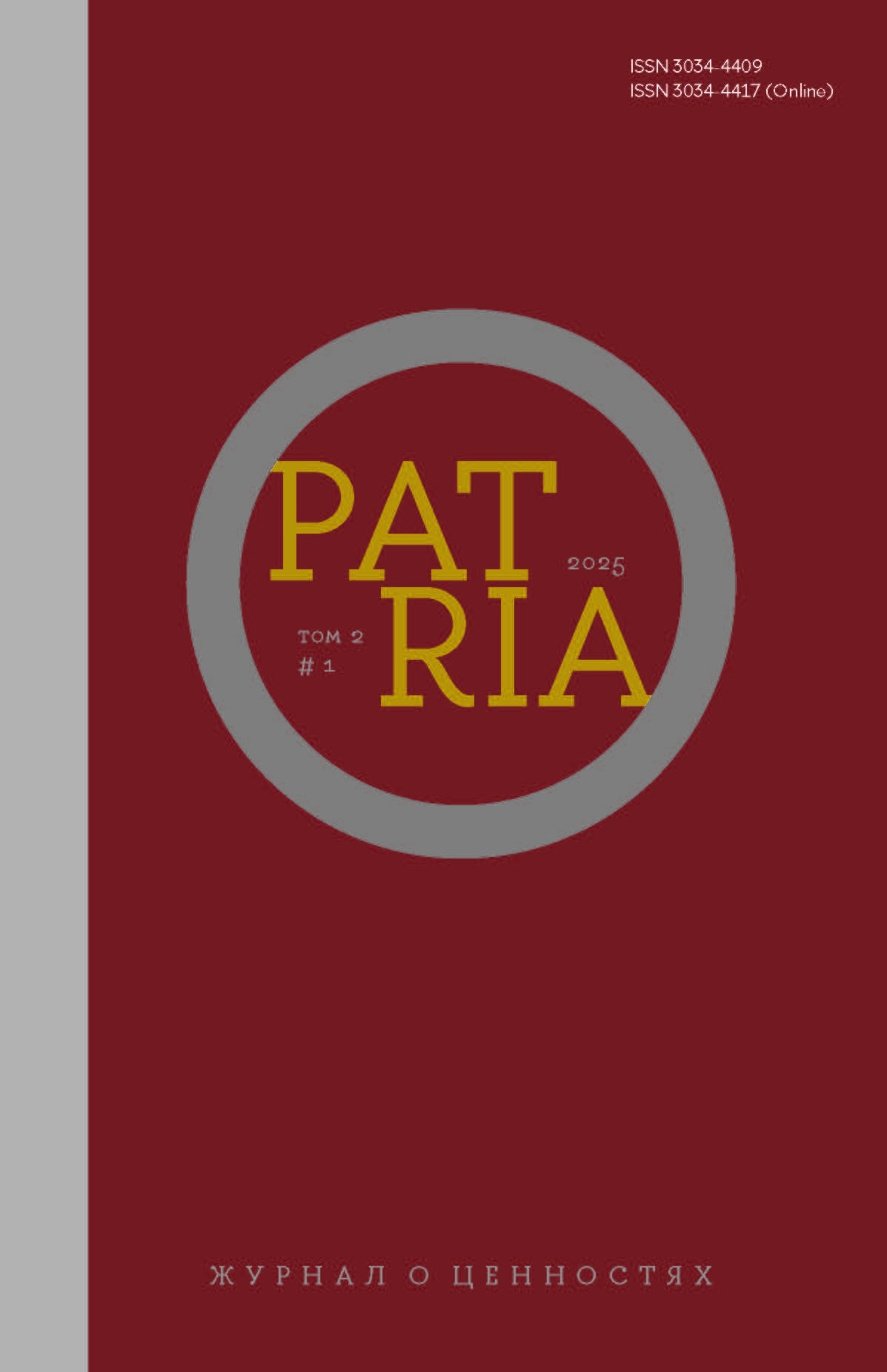Justice as a Pillar of Nationalism
Abstract
The article is devoted to the analysis of the significance of the concept of justice for the construction of nationalism as one of the fundamental practices of a developed industrial society. Using the example of social thought in Ancient Egypt, Babylonia, Antiquity, the Middle Ages and the New Age, it is demonstrated that reflections on the content of the concept of justice and the desire for the practical implementation of this concept have accompanied humanity throughout its history. However, it was in the New Age, within the framework of the formation of industrial society, that the concept of justice acquired special significance, becoming the foundation that ensures the connection and balance of the values of liberal ideology (based on the idea and free individual) and nationalism (postulating the values of collectivism), which became the basis of the modern democratic social order. The pinnacle of the development of modern industrial society, based on the combination of liberalism and nationalism, was the welfare state. However, since the 1980s, there has been a process of gradual rejection of the welfare state (which is beginning to be seen as excessively expensive and hindering the implementation of individual rights), which is a visible sign of the erosion of the modern social order, caused by the imbalance between liberalism (which has taken the form of neoliberalism) and nationalism. Such a loss leads to an as yet unconscious, but nonetheless important, atomization of societies, their disintegration into a conglomerate of parts of different compositions.
Downloads
References
Abbot Sieyès: From the Bourbons to Bonaparte (2003), Saint Petersburg: Aletejya.
Ajzinova I. M. (2013) “European Social Policy during the Crisis: An Overview of the Pension and Health Care Systems in EU Countries”, Nauchnye trudy: Institut narodnohozyajstvennogo prognozirovaniya RAN, no. 11, pp. 7–35.
Anderson B. (2001) Imagined Communities. Reflections on the Sources and Spread of Nationalism, Moscow: Kanon-Press-C.
Batiev L. V. (2012) “Justice and Law in the Philosophy of Thomas Aquinas”, Filosofiya prava, no. 1 (50) (https://cyberleninka.ru/article/n/zakon-i-pravo-v-filosofii-fomy-akvinskogo, accessed on 26.01.2025).
Belyavskij V. (2011) Legendary Babylon and Historical Babylon, Moscow: Lomonosov.
Berri B., Matravers M. (2001) “Justice (Article from the Philosophical Encyclopedia)”, Russia — the West: Philosophical Foundations of Socio-Cultural Tolerance, Ekaterinburg: Izdatel’stvo Ural’skogo universiteta, pp. 143–158.
Bespal’ko V. G. (2020) “Sacred Principles and Content of Justice in Ancient State Law”, Social’no-politicheskie nauki, vol. 10, no. 2, pp. 45–54.
Chernyh S. N. (2011) “The Concept of Justice in Medieval Philosophy”, Vestnik VGTU, no. 4 (https://cyberleninka.ru/article/n/ponyatie-spravedlivost-v-srednevekovoy-filosofii, accessed on 26.01.2025).
Gellner E. (2002) “The Coming of Nationalism. Myths of Nation and Class”, Nations and Nationalism, Moscow: Praksis, pp. 146–200.
Greenfeld L. (1992) Nationalism: Five Roads to Modernity, Cambridge (MA): Cambridge University Press.
Gusejnov A. A., Irlitc G. (1987) A Short History of Ethics, Moscow: Mysl’.
Hamedi A. (2014) “The Concept of Justice in Greek Philosophy (Plato and Aristotle)”, Mediterranean Journal of Social Sciences, vol. 5, no. 27, pp. 1163–1167.
Hazoni Y. (2018) The Virtue of Nationalism, L.: Basic Book.
Hroch M. (2003) Social Precondition National Revival in Europe, Columbia.
Jefferson T. (1992) On Democracy, Saint Petersburg: Res gumana: Lenizdat.
Jeger V. (2001) Paideia. The Education of an Ancient Greek, Moscow: Greko-latinskij kabinet.
Kanarsh G. (2018) “Justice”, Filosofskaya antropologiya, vol. 4, no. 1, pp. 244–262.
Klochkov I. S. (1983) The Spiritual Culture of Babylonia. Man, Fate, Time, Moscow: Nauka.
Kurilla I. (2023) Americans and Everyone Else: The Origins and Meaning of US Foreign Policy, Moscow: Al’pina Pablisher.
Lahman R. (2010) Capitalists Against Their Will: Elite Conflict and Economic Transformation in Early Modern Europe, Moscow: Territoriya budushchego.
Laws of the Babylonian king Hammurapi (2020) (www.hist.msu.ru/ER/Etext/hammurap.htm, accessed on 05.02.2020).
MacIntyre A. (2000) After Virtue: Studies in Moral Theory, Moscow; Ekaterinburg: Akademicheskij proekt: Delovaya kniga.
Materialists of Ancient Greece: A Collection of Texts by Democritus, Heraclitus, Epicurus (1955), Moscow: Gosudarstvennoe izdatel’stvo politicheskoj literatury.
Milanovich B. (2022) Capitalism and Nothing Else: The Future of the System That Rules the World, Moscow: Izdatel’stvo Instituta Gajdara.
Mill J. S. (2006) Reflection on Representative Government, Chelyabinsk: Socium.
Nozik R. (2008) Anarchy, State, and Utopia, Moscow: IRISEN.
Pain E. A., Fedyunin S. Yu. (2017) Nation and Democracy: Prospects for Managing Cultural Diversity, Moscow: Mysl’.
Philosophy of the Era of Early Bourgeois Revolutions (1983), Moscow: Nauka.
Piketti T. (2023) A Brief History of Equality, Moscow: Izdatel’stvo AST.
Pomerants K. (2017) Great Divergence: China, Europe, and the Creation of the Modern World Economy, Moscow: Delo.
Razin A. V. (2004) Ethics, Moscow: Akademicheskij proekt.
Rawls J. (1995) Theory of Justice, Novosibirsk: Izd-vo Novosib. un-ta.
Rožič P. (2014) “A Critique of MacIntyre’s Self-Correction Attempt: A Better Metaphysical Grounding?”, Bogoslovni vestnik, no. 74, pp. 55–59.
Rustow D. A. (1970) “Transitions to Democracy: Toward a Dynamic Model”, Comparative Politics, vol. 2, no. 3, pp. 337–363.
Savrej V. Ya. (2019) “The Concept of Justice in the Ancient Consciousness”, Sovremennaya nauka: aktual’nye problemy i praktiki. Seriya ‘‘Poznanie’’, no. 9, pp. 96–101.
Sidorina T. Yu. (2012) “Operation Welfare State: Has the Welfare State Solved the Problems of the Ideal State?”, Prostranstvo ekonomiki, no. 3, pp. 84–99.
Solovyov V. S. (2012) Justification of Good, Moscow: Institut russkoj civilizacii: Algoritm.
Sorokin P. (2005) Sociology of Revolution, Moscow: Territoriya budushchego.
Spruyt H. (1994) The Sovereign State and Its Competitors, Princeton: Princeton University Press. Trubetskoy S. N. (1910) Metaphysics in Ancient Greece, Moscow.
Uporov I. V. (2016) “Sources and Concept of Natural Human Rights”, Teoriya i praktika sovremennoj nauki, vol. 3, no. 9, pp. 501–506.
Volkov N. S. (2016) “Evolution of the Concept of Justice from Antiquity to the Era of Globalization”, Vestnik Moskovskogo universiteta. Ser. XXVII: Globalistika i geopolitika, no. 1, pp. 72–82.
Zhdanov V. V. (2013) Ideas of Justice in the Context of Pre-Philosophical Categories of Ancient Egyptian Culture, Prostranstvo i Vremya, vol. 4, no. 14, pp. 105–110.
Copyright (c) 2025 HSE University

This work is licensed under a Creative Commons Attribution 4.0 International License.


